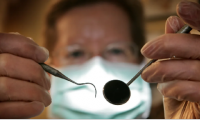-
MMI receives de novo nod for microsurgery robot
- Source: drugdu
- 304
- April 15, 2024
-
Study provides valuable insights into the DCB-only strategy for left main coronary artery disease
- Source: drugdu
- 213
- April 15, 2024
-
UK’s NICE recommends AbbVie’s Aquipta to treat migraines
- Source: drugdu
- 480
- April 13, 2024
-
Rallybio and J&J collaborate to tackle maternal-foetal blood disorder
- Source: drugdu
- 416
- April 13, 2024
-
Researchers call to reduce repeat antibiotic prescriptions for respiratory tract infections
- Source: drugdu
- 384
- April 13, 2024
-
UK study finds screening with a PSA test in prostate cancer can lead to overdiagnosis
- Source: drugdu
- 343
- April 13, 2024
-
Steris to sell dental segment for $787.5M
- Source: drugdu
- 298
- April 13, 2024
-
Blood-Based Machine Learning Assay Noninvasively Detects Ovarian Cancer
- Source: drugdu
- 314
- April 13, 2024
-
Novartis Pays $150M to Nab a Phase 3-Ready Protein Degrader for Prostate Cancer
- Source: drugdu
- 267
- April 13, 2024
-
FDA Approves New Administration Methods for SK Life Science’s Xcorpi for Adults with Partial-Onset Seizures
- Source: drugdu
- 516
- April 13, 2024
your submission has already been received.
OK
Subscribe
Please enter a valid Email address!
Submit
The most relevant industry news & insight will be sent to you every two weeks.













